Home Tags Posts tagged with "al-Qaeda"
al-Qaeda
A double attack on Yemen’s defense ministry in Sanaa left at least 29 dead and more than 70 hurt, officials say.
A suicide car bomb blew up at the gates of the complex in Sanaa’s Bab al-Yaman district, at the entrance to the old city, and a gunbattle followed at a hospital inside.
At least two foreign medical staff are among the dead, medical sources say.
Yemeni security forces are fighting regional rebels and al-Qaeda, while combating lawlessness and army splits.
Defense Minister Mohammed Nasser is currently on a visit to Washington.
No group has said it carried out Thursday’s attack.
Correspondents say it bears the hallmarks of al-Qaeda in the Arabian Peninsula (AQAP).
However, one government minister has blamed people linked to former President Ali Abdullah Saleh.
Officials said the situation was under control and most of the gunmen had been killed.

Deadly attacks hit Yemen defense ministry in Sanaa
“The attack took place shortly after working hours started at the ministry when a suicide bomber drove a car into the gate,” a ministry source said, quoted by Reuters.
The blast was heard hundreds of metres away.
“The explosion was very violent, the whole place shook because of it and plumes of smoke rose from the building,” an eyewitness told the agency.
Officials said a second car followed whose occupants opened fire at the complex, and a battle ensued involving gunmen in military uniforms.
The gunmen occupied a hospital at the complex, they added, but security forces later regained control of the building, which was badly damaged.
“The assailants took advantage of some construction work that is taking place to carry out this criminal act,” the defense ministry said.
They were said to be armed with assault rifles, hand grenades and rocket-propelled grenades.
“Most” of the gunmen were killed, officials said, but it was not clear how many were involved.
The incident comes to aid tight security in the last few weeks following a series of hit-and-run attacks on officials by militants on motorbikes, blamed on AQAP.
[youtube VJ-GfjFrGP0 650]
Two soldiers have been sacked and jailed for looting during last month’s attack on Nairobi’s Westgate shopping centre, Kenyan army chief Julius Karangi has said.
Julius Karangi said that a third soldier was under investigation.
He has previously said that soldiers had only taken water during the four-day siege, despite CCTV footage seeming to show them helping themselves to goods in a supermarket.
Somali Islamist group al-Shabab says it was behind the attack, which killed 67.

Two soldiers have been sacked and jailed for looting during last month’s attack on Nairobi’s Westgate shopping centre
At the same news conference, Police Criminal Investigation Department head Ndegwa Muhoro said that a phone call had been made to Norway during the siege.
One of the suspected attackers has been named as 23-year-old Somalia-born Norwegian national, Hassan Abdi Dhuhulow.
The Kenyan army has said that all four of the attackers died.
Ndegwa Muhoro said that Interpol was helping to analyse the bodies to confirm their identities, reports the AFP news agency.
Officials had initially said there were 10-15 attackers.
Ndegwa Muhoro said that five other people were in detention over the attack and would be charged soon.
Several shop-owners have said that their premises were looted during the siege.
[youtube xuDeRnCEeY4 650]
Hassan Abdi Dhuhulow has been identified as the Norwegian suspect in Kenya’s Westgate shopping centre attack, the BBC revealed.
Hassan Abdi Dhuhulow, 23, is a Norwegian citizen of Somali origin and he is suspected of helping to plan and carry out the attack.
At least 67 people died in the attack in Nairobi, which the al-Qaeda linked group al-Shabab says it carried out.

Hassan Abdi Dhuhulow has been identified as the Norwegian suspect in Kenya’s Westgate shopping centre attack
Last week Norway’s intelligence agency, the PST, said it had sent officers to Kenya to verify reports that a Norwegian citizen had been involved in the assault on the shopping centre, which began on Saturday September 21 and lasted four days.
It is unclear how many militants were involved. Police had initially estimated that there were 10-15 attackers inside the complex, but the CCTV footage which has so far been released by the Kenyan authorities shows just four men.
Hassan Abdi Dhuhulow is believed to be one of those four.
Forensic investigators are still combing through the rubble of Westgate – no bodies have yet been identified and it is not known whether the attackers are alive or dead.
Hassan Abdi Dhuhulow was born in Somalia, but he and his family moved to Norway as refugees in 1999.
[youtube Los42tdwpWk 650]
American officials say US Navy SEALs have carried out two separate raids in Libya and Somalia targeting senior Islamist militants.
In Libya, US commandos captured an al-Qaeda leader accused of the 1998 bombings of the US embassies in Kenya and Tanzania.
Anas al-Liby was seized in the capital Tripoli.
A leader of the al-Shabab group was targeted in southern Somalia, but that raid appears to have failed.
The al-Shabab leader – who has not been identified – is suspected of involvement in last month’s attack in the Westgate shopping centre in Kenya’s capital Nairobi, which left at least 67 people dead.
Al-Shabab has said it carried out the attack on September 21.
Anas al-Liby’s relatives and US officials said he had been seized in the Libyan capital early on Saturday.
He was parking outside his house when three vehicles encircled him, his car’s window was smashed and his gun was seized before he was taken away, his brother Nabih was quoted as saying by AP.
He added that his brother’s wife also saw the attack, describing the abductors as foreign-looking “commandos”.
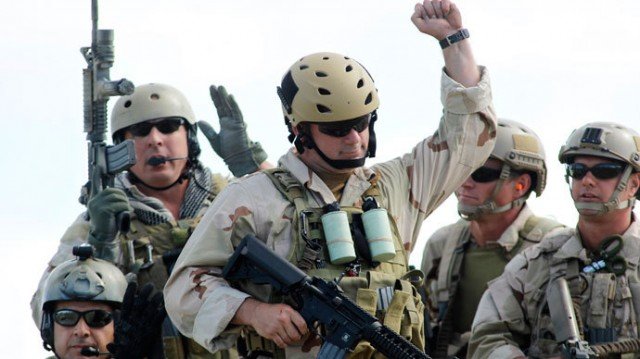
US Navy SEALs have carried out two separate raids in Libya and Somalia targeting senior Islamist militants
The raid was conducted with the knowledge of the Libyan government, a US official was quoted as saying by CNN.
Anas al-Liby “is currently lawfully detained by the US military in a secure location outside of Libya”, Pentagon spokesman George Little said.
The 49-year-old is believed to have been one of the masterminds behind the 1998 US embassy attacks, which killed more than 220 people in Kenya and Tanzania.
He has been indicted in a New York court in connection with the attacks.
Anas al-Liby – whose real name is Nazih Abdul-Hamed al-Ruqai – has been on the FBI’s most wanted list for more than a decade with a $5 million bounty on his head.
Al-Qaeda’s leadership has been consistently targeted since the killing of Osama Bin Laden by US special forces in 2011 in Pakistan.
The US defense department has also confirmed that special forces carried out a seaborne operation in Somalia’s coastal town of Barawe on Saturday.
George Little said the forces “were involved in a counter-terrorism operation against a known al-Shabab terrorist”. He declined to provide any further details.
Initial reports in the US media quoted unnamed US officials as saying that the suspect had been captured or killed by US Navy SEALs in the pre-dawn raid on a villa.
However, the officials later said that the SEALs failed to find the intended target, who was not identified.
The raid was carried out by members of Seal Team Six – the same unit that killed bin Laden, a US military official told AP.
The official added that in Barawe the commandos had decided to abort the mission after encountering fierce resistance from al-Shabab fighters.
“The Barawe raid was planned a week and a half ago,” a US security official told the New York Times.
“It was prompted by the Westgate attack,” added the official, who was speaking on the condition of anonymity.
[youtube Bwe_C0XT9pk]
Kenya military named four men believed to have been involved in the deadly shopping centre attack in Nairobi last month.
Al-Shabab militants Abu Baara al-Sudani, Omar Nabhan, Khattab al-Kene and Umayr – shown in new CCTV footage – were killed during the standoff.
Kenya said previously 10-15 militants had been involved, but the police chief says the figure may now be four to six.
The al-Shabab group said it carried out the attack on the Westgate mall on September 21, leaving at least 67 dead.
The al-Qaeda-linked group said the attack was in retaliation for Kenya’s military involvement in Somalia.
The naming of the men came as CCTV footage was aired showing four attackers calmly walking through a room in the mall holding machine guns.
Kenya Defense Forces spokesman Major Emmanuel Chirchir told Reuters news agency: “I confirm these were the terrorists; they all died in the raid.”

The naming of the Nairobi mall attack suspects came as CCTV footage was aired showing four attackers calmly walking through a room in the mall holding machine guns
Reuters quoted Maj. Emmanuel Chirchir as saying that al-Sudani was an “experienced fighter” from Sudan and was believed to be the leader of the group.
Maj. Emmanuel Chirchir said Omar Nabhan was a Kenyan of Arab origin and Khattab al-Kene a Somali linked to al-Shabab. Further details about Umayr had not yet been verified, he said.
Kenyan police chief David Kimaiyo told KTN television station it was now believed that four to six gunmen had carried out the attack, not 10 to 15.
“None of them managed to escape from the building after the attack,” he said.
David Kimaiyo also said that wanted British woman Samantha Lewthwaite had not been involved.
“We have also established that she was not part of the attackers in the building. There was no woman,” he said.
Samantha Lewthwaite, 29, is the widow of Jermaine Lindsay, one of the four suicide bombers who attacked London on July 7, 2005.
Kenya had earlier said five attackers were killed in the security operation and that nine people were in custody.
The latest CCTV footage is from a limited part of the complex and, with some eyewitnesses reporting a two-pronged attack, it is too early to say definitively how many gunmen were in the building.
In addition to the 67 people killed in the attack, a further 39 are still missing, according to the Kenyan Red Cross.
Al-Shabab is banned as a terrorist group by both the US and the UK and is believed to have between 7,000 and 9,000 fighters.
Its members are fighting to create an Islamic state in Somalia.
[youtube 6v27M7cbd60]
Al-Qaeda leader Ayman al-Zawahiri has issued a message marking the 12th anniversary of the September 11, 2001 attacks.
In the audio message, Ayman al-Zawahiri talks of the need for small-scale attacks – and even a boycott – to damage the US economy.
The message may be seen as a sign of diminishing ambitions and a more realistic assessment of what al-Qaeda’s central organization can achieve.
Ayman al-Zawahiri’s message also praised the bombings in Boston in April.
His message begins with a familiar claim that his organization has the upper hand.
He says that the US has fled Iraq and Afghanistan in “defeat”.
He goes on to emphasize the importance of so-called “lone-wolf”, or small-scale attacks as part of al-Qaeda’s strategy.
Such attacks, he argues, will have an economic impact above all.
“We must bleed America economically by provoking it, so that it continues its massive expenditures on security. America’s weak spot is its economy, which began to totter from the drain of its military and security expenditure,” Ayman al-Zawahiri says.
Ayman al-Zawahiri advocates “continuing the drain of military and security expenditures so that we keep America in a state of tension and anticipation, [wondering] when and where the next blow will come”.
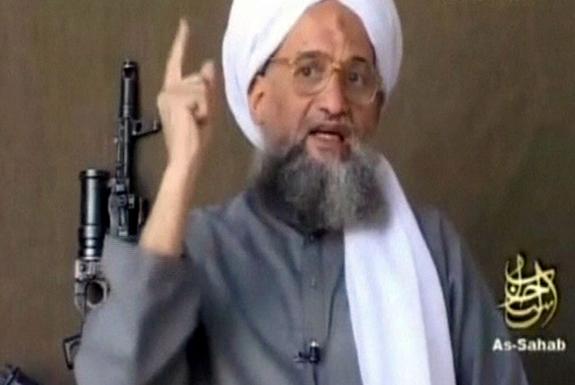
Al-Qaeda leader Ayman al-Zawahiri has issued a message marking the 12th anniversary of the September 11, 2001 attacks
“Keeping America in a state of tension and anticipation does not cost us anything but [organizing] dispersed strikes here and there. In other words, just as we defeated it in a war of nerves in Somalia, Yemen, Iraq and Afghanistan, we must afflict it with a similar war in its own home.
“These dispersed strikes can be carried out by one brother, or a small number of brothers.”
The emphasis on smaller-scale strikes may well be seen as an acknowledgement of a diminishing ability of al-Qaeda’s central leadership to plan and carry out major, organized attacks of the type it managed in the past.
That shift is evident in Ayman al-Zawahiri calling on supporters to begin an economic boycott.
“We must explain to them that every dollar’s worth of goods that we buy from America and her allies amounts to a bullet or shrapnel that kills a Muslim in Palestine or Afghanistan.”
Most analysts believe that the al-Qaeda core in Pakistan has been severely damaged and this message appears to be an acknowledgement of that reality.
However, affiliates in other parts of the world – notably al-Qaeda in the Arabian Peninsula, based in Yemen – are said by government officials to remain a threat.
Ayman al-Zawahiri, who has historically tended to focus more on ideology and strategy, also spends a significant amount of the message talking about recent events in Egypt.
He says that the US was behind the “coup” against the Muslim Brotherhood.
He also criticizes Mohamed Morsi, the deposed president who hails from the Muslim Brotherhood, saying he was not governing according to Islamic law and had committed to abide by security agreements with the US and Israel.
Ayman al-Zawahiri, whose background before joining al-Qaeda was in Egypt’s Islamist movements, also emphasizes his opposition to the Brotherhood’s willingness to work through democratic politics.
He criticizes other Islamist movements in places like Tunisia for coming to “an understanding with America”.
The events in the Middle East have raised serious ideological challenges for al-Qaeda, with it appearing increasingly irrelevant amid signs that protests, people power and even democratic elections might be a more viable vehicle for change than the kind of violence that al-Qaeda espoused.
However, with the optimism of the past few years fading fast, Ayman al-Zawahiri appears to be hoping that al-Qaeda’s ideology of rejecting democracy and promoting uncompromising violence might be able to gain more of a foothold.
Syria remains a key focus for international attention – including for al-Qaeda. Ayman al-Zawahiri warns Islamist opposition groups there not to come to any agreement with “secularists” who are also fighting the Assad regime.
“Let what happened in Egypt be a lesson to them,” Ayman al-Zawahiri says, before arguing that the jihadists groups need to unite in the region.
This may well be a reference to recent reports of splits and divisions, not just within Syrian jihadist groups but also with the Iraqi-based groups.
[youtube YTNNXYcwG7M]
Eighteen of the 19 US diplomatic missions recently closed due to security threats will reopen on Sunday.
The state department says its embassy in the Yemeni capital Sanaa will stay closed “because of ongoing concerns”.
The US closed 19 diplomatic missions in the Middle East and Africa last Sunday in response to what it said was a threat of a terrorist attack.
The consulate in the Pakistani city of Lahore, which closed after a separate threat, will also not reopen yet.
“We will continue to evaluate the threats to Sanaa and Lahore and make subsequent decisions about the reopening of those facilities based on that information,” said spokeswoman Jen Psaki.
“We will also continue to evaluate information about these and all of our posts and to take appropriate steps to best protect the safety of our personnel, American citizens travelling overseas, and visitors to our facilities.”
On Thursday, at least 14 suspected al-Qaeda militants – reportedly including seven from Saudi Arabia – were killed in Yemen in three drone strikes, Yemeni officials said.
The number of US strikes in Yemen has been stepped up over the past month.
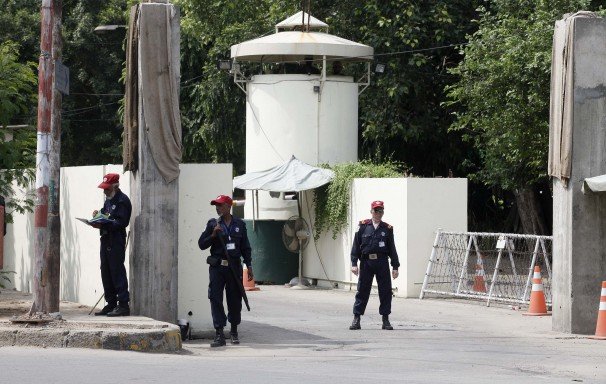
Eighteen of the 19 US diplomatic missions recently closed due to security threats will reopen on Sunday
Yemen is a stronghold of al-Qaeda in the Arabian Peninsula (AQAP) – an al-Qaeda offshoot considered by Washington to be the most dangerous to the West.
The US statement said the Sanaa embassy would stay closed because of concerns about a “threat stream” emanating from AQAP, without providing further details.
Most US employees at the Sanaa embassy were ordered to leave the country on Tuesday.
The embassy closures, along with a US global travel alert, came after the US reportedly intercepted al-Qaeda messages.
Reports said they were between senior figures talking about a plot against an embassy.
The US closed its consulate in Lahore on Thursday and evacuated all non-essential staff following what it described as “a credible threat”.
US officials said the evacuation was undertaken as a precaution and not related to the closure of the other diplomatic missions.
Thursday’s drone attacks in Yemen targeted a group of suspected militants, killing four of them in Wadi al-Jadd in the southern province of Hadramout, said Yemeni officials.
A day earlier, Yemen said it had foiled a major al-Qaeda plot against oil pipelines and ports.
Two strikes in Marib and Hadramout provinces killed 10 suspected militants, the security officials said, while another seven people died in a drone attack on Wednesday.
While the US has acknowledged targeting militants in Yemen with drones, it does not comment publicly on its policy or the raids.
About 30 suspected militants have been killed in a series of such raids in Yemen since 28 July, news agencies report.
[youtube J299lm5G0_s]
Yemen announces it has foiled an al-Qaeda plot to blow up oil pipelines and seize some of the country’s main ports.
Security remains tight – and hundreds of armored vehicles have been deployed to protect key targets.
Both the US and UK have withdrawn diplomatic staff from Yemen, prompted by intelligence reports of renewed terrorist activity.
The US is reported to be preparing special operations forces for possible strikes against al-Qaeda in Yemen.
It appears that Yemen was at the centre of a complex and audacious plot which – had it succeeded – would have given al-Qaeda control over a crucial aspect of the country’s infrastructure.
Yemeni government spokesman Rajeh Badi said the plot involved blowing up oil pipelines and taking control of certain cities – including two ports in the south, one of which accounts for the bulk of Yemen’s oil exports and is where a number of foreign workers are employed.
“There were attempts to control key cities in Yemen like Mukala and Bawzeer,” said Rajeh Badi.
“This would be co-ordinated with attacks by al-Qaeda members on the gas facilities in Shebwa city and the blowing up of the gas pipe in Belhaf city.”
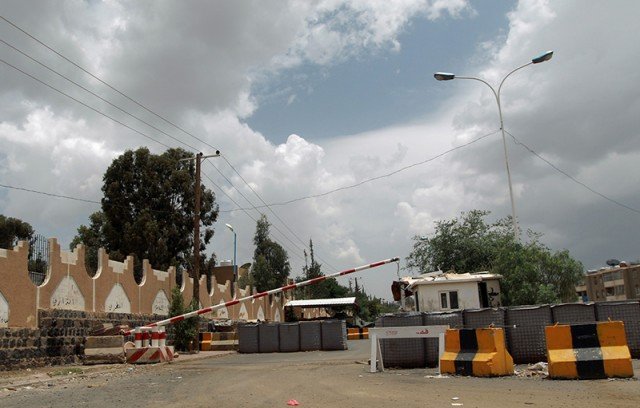
Yemen has foiled an al-Qaeda plot to blow up oil pipelines and seize some of the country’s main ports
Al-Qaeda members dressed as soldiers were to be outside the ports, he said. On a given signal they were to invade the facility and take it over.
Yemeni officials quoted by AP news agency said they believed the motive for the planned attacks was retaliation for the killing of senior al-Qaeda figure Said al-Shihri, who was critically wounded in a November drone strike and later died of his injuries.
Tanks and troops have surrounded foreign missions, government offices and the airport, and senior officials are being advised to limit their movements.
Both the US, which closed 20 embassies worldwide on Sunday, and the UK have withdrawn diplomatic staff from Yemen and urged their citizens to leave.
The US embassy and consulate closures reportedly followed intercepted conversations between two senior al-Qaeda figures, including top leader Ayman al-Zawahiri, suggesting terrorist attacks.
According to the New York Times, the US intercepted communications between Ayman al-Zawahiri and the group’s head in Yemen, Nasser al-Wuhayshi.
The paper said the conversation represented one of the most serious plots since the 9/11 attacks.
The Yemeni government spokesman said the international community “feared the reaction of al-Qaeda” and added: “We understand such fears.”
But the foreign ministry has criticized the embassy withdrawals, saying “the evacuation of embassy staff serves the interests of the extremists.”
Although the US has previously sent special forces to train counter-terrorist units, there are now suggestions that the Joint Special Operations Command (JSOC), may be preparing units for strike operations, the sources said.
JSOC co-operates closely with the CIA, which has mounted four drone strikes in Yemen over the past 10 days.
Yemen is the base of al-Qaeda in the Arabian Peninsula (AQAP) and both the White House and the US state department have said the current threat comes from AQAP but have refused to divulge further details.
[youtube NQP2hN0NQdA]
Al-Qaeda has claimed two mass jailbreaks in Iraq, which freed hundreds of prisoners including senior leaders of the Islamist militant group.
In an online statement, al-Qaeda said Sunday’s attack was the final one in a campaign aimed at freeing inmates.
At least 20 security guards died when gunmen stormed the Abu Ghraib and Taji jails near Baghdad.
Abu Ghraib gained global notoriety in 2004 when images were released showing US guards abusing Iraqi detainees.
Iraqi officials had previously tortured regime opponents in Abu Ghraib during Saddam Hussein’s rule.
On Tuesday, an al-Qaeda affiliate calling itself the Islamic State of Iraq and the Levant said it carried out the attacks on the prisons.
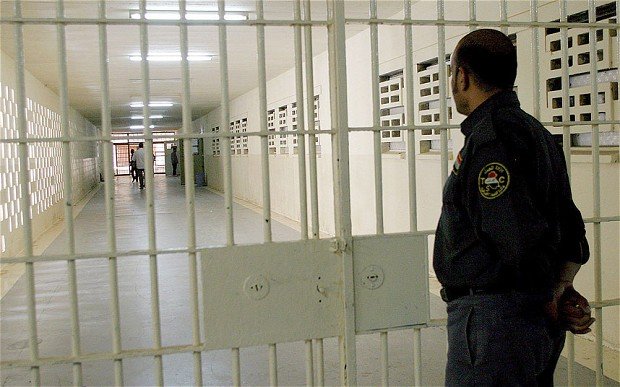
At least 20 security guards died when gunmen stormed the Abu Ghraib and Taji jails near Baghdad
The group, which was formed of al-Qaeda groups in Iraq and Syria, said it had spent “months planning” the attacks on Abu Ghraib to the west of the capital and Taji to the north.
The group also claimed some 500 militants were among the hundreds of prisoners who had escaped.
Iraqi authorities initially denied any prisoners had escaped in the assaults, but later acknowledged “some” prisoners escaped.
The Iraqi interior ministry said in a statement on Tuesday that the gunmen had received help from some of the prison guards.
Fighting raged for several hours after the jails came under attack on Sunday night.
Gunmen fired mortar rounds at the prisons, and then used car bombs at the entrances.
The situation was eventually brought back under control on Monday morning, with the use of military helicopters.
Justice ministry spokesman Wissam al-Firaiji earlier said the attackers, whom he called terrorists, had been well-armed.
“The attack against Taji jail alone was carried out by nine suicide bombers and three car bombs driven by suicide bombers,” he told reporters.
“The attackers also lobbed more than 100 mortar shells,” he said, adding that the inmates were “under control” again.
[youtube DK64aaoY02w]
Tamerlan and Dzhokhar Tsarnaev apparently used an online magazine produced by al-Qaeda as their guide for how to make pressure cooker bombs that they set off at the finish line of last week’s Boston Marathon, killing three and injuring more than 180 others.
Dzhokhar Tsarnaev, 19, reportedly confessed to the FBI that he and his brother Tamerlan were the ones behind the bombing and that they acted alone.
The Boston bomber also said that they were driven to commit the attack because of their feelings against the wars in Iraq and Afghanistan.

Tamerlan and Dzhokhar Tsarnaev used an al-Qaeda online magazine to make pressure cooker bombs they set off at the finish line of the Boston Marathon
Dzhokhar Tsarnaev remains in a Boston hospital but he is expected to be transported in the next few days as his condition was downgraded from “serious” to “fair”.
The suspect sustained unspecified damages during the course of the last week, most likely from the firefight with police on Friday morning that led to the death of his brother, Tamerlan Tsarnaev.
Dzhokhar Tsarnaev is reportedly telling investigators that the deadly attacks were spearheaded by his brother, Tamerlan, who is thought to be the more radical of the two.
Tamerlan Tsarnaev, a 26-year-old father of one, allegedly went through fits of rage, both verbally and physically abusing his wife who he called a “slut” and a “prostitute”.
Federal investigators have already questioned Tamerlan Tsarnaev’s wife, 24-year-old Katherine Russell Tsarnaev, and the brothers’ parents, Zubeidat Tsarnaeva and Anzor Tsarnaev, are thought to be on their way to America for questioning from their native Russia.
It was revealed earlier today that no relatives have claimed Tamerlan Tamerlan’s body.
[youtube eNbgImH4ZNI]
Two North African suspects thought to be linked to al-Qaeda in the Islamic Maghreb (AQIM) have been arrested in Spain, according to police.
An Algerian identified as Nou Mediouni was arrested in Zaragoza, northern Spain, the interior ministry said.
The other suspect, a Moroccan named Hassan El Jaaouani, was arrested in Murcia in the south.
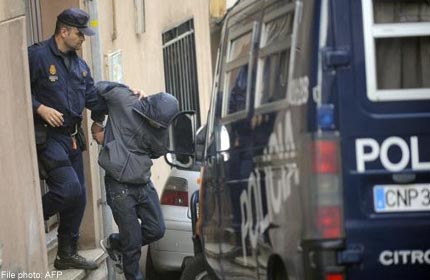
Two North African suspects thought to be linked to al-Qaeda in the Islamic Maghreb have been arrested in Spain
They have “a similar profile to the two suspects who carried out the Boston attacks”, the ministry said. French police had helped to track them down.
AQIM is among several Islamist groups fighting French and West African troops in Mali.
It has its roots in the bitter Algerian civil war of the early 1990s, but in 2007 it emerged as an international jihadist group linked to Osama Bin Laden’s network. AQIM says its aim is to spread Islamic law and it is known for kidnapping Westerners and extracting ransoms.
It is not clear whether the men arrested in Spain are suspected of planning any attacks. Their similarity to the Boston marathon bombers was not explained in the ministry statement.
Moroccan Islamists linked to al-Qaeda were found guilty of the 2004 Madrid train bombings which killed nearly 200 people and injured more than 1,800.
[youtube a0QOop0RE0A]
Canadian authorities have arrested and charged two people with conspiring to carry out an “al-Qaeda inspired” attack on a passenger train in Toronto.
At a news conference, the authorities said the suspects Chiheb Esseghaier, 30, and Raed Jaser, 35, were arrested in Montreal and Toronto on Monday.
They allegedly planned to derail a VIA passenger train in the greater Toronto area. It was not clear when.
The suspects will now appear in court on Tuesday for a bail hearing.

Canadian authorities have arrested and charged two people with conspiring to carry out an “al-Qaeda inspired” attack on a passenger train in Toronto
The Royal Canadian Mounted Police (RCMP) said the surveillance operation leading to the arrests of the two suspects was “a result of extensive collaborative efforts”.
They said the two men were not Canadian citizens and were supported by “al-Qaeda elements in Iran” but there was no evidence of state sponsorship.
Their plan was to derail a train and “kill and hurt people”.
Chief Spt. Jennifer Strachan said the two men had sought to target “a specific route, but not necessarily a specific train”.
VIA operates passenger rail services across Canada.
At the same time, the RCMP said they believed the plot was in the planning stage and “there was no imminent threat to the general public”.
“Each and every terrorist arrest the RCMP makes sends a message and illustrates our strong resolve to root out terrorist threats and keep Canadians and our allies safe,” Assistant Commissioner James Malizia said.
The RCMP also said that FBI agents from the US were involved in the operation to foil the attack.
There was no connection between the plot and last week’s Boston Marathon bombings, a US justice department official was quoted as saying by the Associated Press news agency.
[youtube NoT2XHZRgqk]
Sulaiman Abu Ghaith, who was described as a spokesman for Osama Bin Laden, has been arrested and will be tried in New York City, the US has confirmed.
Sulaiman Abu Ghaith was captured within the last week in Jordan, Congressman Peter King said on Thursday.
He is Osama Bin Laden’s son-in-law and played a role in plotting the attacks of 9/11, US officials said.
Osama Bin Laden was killed in a May 2011 raid on his hideout in Pakistan by a team of US commandos.
Sulaiman Abu Ghaith is scheduled to appear in a federal court on Friday on charges of conspiracy to kill United States nationals.
“Sulaiman Abu Ghaith held a key position in al-Qaeda, comparable to the consigliere in a mob family or propaganda minister in a totalitarian regime,” said FBI Assistant Director-in-Charge George Venizelos in a statement.
“He used his position to threaten the United States and incite its enemies.”
A teacher and mosque preacher in Kuwait, Sulaiman Abu Ghaith was stripped of his Kuwaiti citizenship after 9/11.
Justice department officials say Sulaiman Abu Ghaith served alongside Osama Bin Laden from May 2001 to 2002, speaking on behalf of al-Qaeda and warning that attacks similar to 9/11 would continue.
Specifically, on September 12, 2001, Sulaiman Abu Ghaith appeared with Osama Bin Laden and Ayman al-Zawahiri to warn the US that a “great army is gathering against you” and called upon “the nation of Islam” to do battle against “the Jews, the Christians and the Americans,” according to court records.

Sulaiman Abu Ghaith, who was described as a spokesman for Osama Bin Laden, has been arrested and will be tried in New York City
Sulaiman Abu Ghaith was reportedly smuggled to Iran sometime in 2002.
A Jordanian security official told the Associated Press that Sulaiman Abu Ghaith was handed over last week to US officials under both countries’ extradition treaties.
Peter King called the arrest a “very significant victory” in the fight against al-Qaeda.
“One by one, we are getting the top echelons of al-Qaeda,” the Republican congressman said.
“I give the administration credit for this. It’s steady and it’s unrelenting and it’s very successful.”
Sulaiman Abu Ghaith’s trial will mark one of the first prosecutions of senior al-Qaeda leaders on US soil.
Since 9/11, 67 foreign terror suspects have been convicted in US federal courts, according to data obtained by the group Human Rights First.
Some US lawmakers disagreed with the decision to try Sulaiman Abu Ghaith in New York.
“When we find somebody like this, this close to Bin Laden and the senior al-Qaeda leadership, the last thing in the world we want to do, in my opinion, is put them in a civilian court,” said Republican Senator Lindsey Graham on Thursday.
“This man should be in Guantanamo Bay,” he said.
A senior administration official said that Barack Obama’s national security team “unanimously agreed” that prosecution of Sulaiman Abu Ghaith in federal court was in the US’ national security interests.
“The administration is seeking to close Guantanamo, not add to its population,” the official said.
[youtube PpoWclMxiJY]
[youtube 0GBGZhgHoNs]
Mokhtar Belmokhtar, a top Islamist militant, has been killed by Chadian soldiers in Mali, Chad’s armed forces have announced.
His death was announced on Chadian state television but has not been confirmed by other sources.
Mokhtar Belmokhtar is a former al-Qaeda leader said to have ordered January’s attack on an Algerian gas plant where at least 37 hostages were killed.
Chadian troops are fighting Islamist militants in Mali as part of an international force led by France.
“Chadian forces in Mali completely destroyed the main jihadist base in the Adrar de Ifhogas mountains… killing several terrorists including leader Mokhtar Belmokhtar,” the army statement on Chadian TV said.
Weapons, equipment and 60 vehicles were seized, it added.
If confirmed, Mokhtar Belmokhtar’s death would be a major blow to Islamist militants in Mali.

Mokhtar Belmokhtar is a former al-Qaeda leader said to have ordered January’s attack on an Algerian gas plant where at least 37 hostages were killed
Reports of the killing came a day after Chadian President Idriss Deby said the country’s forces killed al-Qaeda militant Abdelhamid Abou Zeid during clashes in northern Mali.
Abdelhamid Abou Zeid – whose death is still to be confirmed by DNA evidence – is said to be second-in-command of al-Qaeda in the Islamic Maghreb (AQIM), which is fighting foreign forces in Mali.
Algerian-born Mokhtar Belmokhtar has been fighting as an Islamist militant for more than two decades.
He claimed to have received military training in Afghanistan before returning to Algeria, where he lost an eye fighting in the Islamist insurgency in the 1990s.
Mokhtar Belmokhtar then joined AQIM – which operates across the Sahara – before breaking off to lead his own group.
He is also known as “Mr. Malboro” because of his alleged role in cigarette smuggling in the region.
Senior al-Qaeda militant Abdelhamid Abou Zeid has been killed in northern Mali, Chadian President Idriss Deby has announced.
Idriss Deby said Chadian forces killed Abdelhamid Abou Zeid during clashes in the remote region.
Abdelhamid Abou Zeid is said to be second-in-command of al-Qaeda in the Islamic Maghreb, which is fighting foreign forces in Mali.
The Algerian national is accused of killing two Western hostages – Briton Edwin Dyer in 2009 and Frenchman Michel Germaneau the following year.
His death will immediately raise questions over the state of several French hostages who are widely believed to have been in Abdelhamid Abou Zeid’s custody.
In January France sent some 3,500 troops to northern Mali to oust various Islamist militant groups who had seized a vast area of the Sahara desert.
Chad is one of several African countries to have supported the French operation.
After recapturing the region’s main towns, French and Chadian troops have been battling Islamist fighters in the Adrar des Ifoghas mountains north of Kidal, where the militants had regrouped, in recent weeks.

Senior al-Qaeda militant Abdelhamid Abou Zeid has been killed in northern Mali, Chadian President Idriss Deby has announced
Algeria’s Ennahar TV reported earlier this week that Abdelhamid Abou Zeid was among 40 militants killed in the area near the Algerian border.
“Chadian forces killed two jihadi leaders, including Abou Zeid,” Idriss Deby said on Friday, without giving any further details.
President Idriss Deby was speaking after the funerals of Chadian soldiers killed in the fighting.
Algerian media have reported that security operatives have taken DNA samples from two of Abdelhamid Abou Zeid’s relatives to compare with the body which is reportedly his.
A US official – speaking on condition of anonymity – said Washington found reports that Abdelhamid Abou Zeid was killed “very credible”, according to the AFP news agency.
However, France reacted with caution to the reports, with government spokeswoman Najat Vallaud-Belkacem stressing that his death was so far unconfirmed.
Earlier unverified reports in the French media said that the militant was killed during fighting against French army units.
Abdelhamid Abou Zeid – believed to be in his 40s – was known as the most violent al-Qaeda commander in the region.
He was last seen in public in the Malian cities of Timbuktu and Gao seized by Islamist groups last year.
[youtube fznd3MFxceo]
Mohammed Abu Jamal Ahmed, one of the suspects in the Benghazi attack that killed U.S. Ambassador Christopher Stevens and three other Americans, has been arrested, NBC News is reporting.
Mohammed Abu Jamal Ahmed, who is accused of playing a role in September’s deadly attack against the U.S. Consulate in Libya, was detained in Cairo, according to NBC, which cited two unnamed sources in its report.
In addition to his possible involvement in the Benghazi attack, Mohammed Abu Jamal Ahmed is also accused of illegally trafficking weapons from Libya to Egypt.
Mohammed Abu Jamal Ahmed was freed from an Egyptian prison around the time that former President Muammar Gadhafi was ousted from power.
He is believed to be affiliated with a number of militant groups in Iraq and Afghanistan and the Wall Street Journal reported in October that he was trying to establish a new branch of al-Qaeda.

Mohammed Abu Jamal Ahmed, one of the suspects in the Benghazi attack that killed US Ambassador Christopher Stevens and three other Americans, has been arrested in Cairo
Sources told the Journal that he had already secured financing for the group.
Early intelligence reports suggested that Mohammed Abu Jamal Ahmed had established training camps in Libya for the fighters involved in the September 11 attack that killed four Americans, according to Journal.
The White House and the Pentagon initially said the attack was a spontaneous reaction to anti-Muslim film The Innocence of Muslims directed by an American.
That story later changed, however, as it was revealed that those involved in the attack had militant ties – and that administration officials were aware of those ties when they publicly claimed that the attack was in response to anti-Muslim film.
David Petraeus has told US Congress that the CIA believed almost immediately that al-Qaeda-linked terrorists were behind the September 11th attacks in Benghazi, according to a leading Republican congressman.
Representative Peter King of New York, a member of the House Intelligence Committee that David Petraeus briefed, said that the former general left a “different impression” today than he had when he testified on Capitol Hill three days after the attack.
Now, Peter King said, David Petraeus insisted that the “original talking points prepared by the CIA were different than the final ones put out” and used by Susan Rice, U.S. ambassador to the United Nations, on Sunday talk shows to say – incorrectly – that the attack was sparked by anger over an anti-Islam video made in California.
“The original talking points were much more specific about al-Qaeda involvement and yet the final ones just said <<indications of extremists>> even though it was clearly evident to the CIA that there was al-Qaeda involvement,” Peter King said.
The former CIA director was giving classified testimony and was accompanied by a CIA analyst. Peter King said David Petraeus did not speak under oath.
David Petraeus arrived early Friday for closed hearings on Capitol Hill as lawmakers seek details from the retired general about the September 11 attack on the U.S. Consulate in Benghazi, Libya, that killed the U.S. ambassador Chris Stevens and three other Americans.
Peter King said that there was only brief mention by David Petraeus of his affair with biographer Paula Broadwell, which triggered his shock resignation last Friday.
“He was asked at the start did that have any impact on his testimony, he said no…10 seconds into it, that was off to the side.”

David Petraeus has told US Congress that the CIA believed almost immediately that al-Qaeda-linked terrorists were behind the September 11th attacks in Benghazi
The New York congressman said that David Petraeus had explained that the talking points ultimately used by Susan Rice had been altered by inputs by a number of other government agencies after the CIA had made its assessment.
“He said that it goes though a long process, an interagency process and when they came back it was taken out.”
The House Intelligence Committee, which was hearing from David Petraeus before he briefed the Senate Intelligence Committee, met in a secure room several floors below the main area of the Capitol Visitors Centre, where tourists gather when they are visiting Congress.
Republicans and some Democrats have demanded an explanation of why the Obama administration initially described the attack at Benghazi as a protest gone awry, leading to the deaths of U.S. Ambassador Christopher Stevens, diplomat Sean Smith and CIA contractors and former Navy SEALS Glen Doherty and Tyrone Woods.
Five days after attack, the administration sent Susan Rice onto the Sunday news shows to describe what precipitated the assault. She relied on initial intelligence talking points that subsequently proved incorrect.
Deputy CIA Director Mike Morell told the House committee on Thursday that Susan Rice was provided with an unclassified version of events at the American mission, according to Rep. Adam Schiff, D-California, a committee member.
The assessment concluded that a spontaneous protest over anti-Islam video, The Innocence of Muslims, had evolved into an attack on the American consulate, a description that Rice presented in the television interviews.
David Petraeus hoped that by testifying he would put an end to some of the wilder rumors following his resignation over reveal of his affair with Paula Broadwell.
“He did not like the conspiracies going around that somehow he had something to hide on Benghazi,” said retired Colonel Peter Mansoor, who served as David Petraeus’ executive officer in Iraq.
“I think his offer to testify crossed with the Congress’ request to him to testify. But anyway he looks forward to that.”
[youtube 8UpJsdl6YvU]
The first Somali government and African Union (AU) troops are reported to have entered the strategic Somali port of Kismayo, witnesses and officials say.
They have been battling the al-Shabab militia for control of the city.
On Saturday, the al-Qaeda-aligned militants said they had withdrawn from Kismayo after an AU military assault.
Kenyan and Somali forces had launched a beach assault on the Islamist group’s last major bastion the day before, but had met some resistance.
Reports as to the size and make-up of the AU contingent have been mixed.
One resident said Somali Service that a small infantry unit of 11 Somali soldiers had entered the city from the west and were patrolling on foot on the main roads of Kismayo, while another said he had seen both Kenyan and Somali troops entering the city centre from the airport.
Around 100 troops were seen by a tribal elder in Kismayo taking over a police station and setting up an outpost on top of a tall building.
Somali government spokesman in Kismayo Mohamed Faarah Daher said AU and Somali forces had gone in to the city to establish security for the population, and had also taken up positions at the airport and sea port.
Kenyan troops are part of an African force trying to wrest control of Somalia from militants for the new United Nations-backed president.
After resisting the AU and Somali advance on Friday, al-Shabab announced it had shut its five-year administration in Kismayo the next day for strategic reasons.
Residents had spoken of increasing tension inside the port town amid the power vacuum that ensued.
A number of influential clan figures have been murdered in the past few days.
The Kenyan military said that Kenyan, Somali and AU troops were “currently consolidating the gains in Kismayo and expanding out to the rest of the city”, according to a message on its official Twitter account.
Kenyan soldiers have “established no-fire zones around markets, schools, mosques and hospitals”, another message read. Kenyan troops are reported to be present in Kismayo’s suburbs but not in the city centre.
The Kenyan Deputy Prime Minister Musalia Mudavadi said Kenya welcomed the move on Kismayo.
“Kenya has been bearing the brunt of the instability in Somalia for a very long time. We host 650,000 refugees and we have been seeing sporadic incidents of grenade attacks in Kenya,” he said.
“So any action supported by the international community… is very positive because it is going to give room for Somalia to stabilize,” he added.
Last week, a Kenya military spokesperson said he feared the withdrawal might be a trap, making the army wary of entering Kismayo. There have been unconfirmed reports that al-Shabab may have mined parts of the town.
Correspondents say the loss of Kismayo will be a major blow to the Islamists.
Somalia’s second largest port is a significant source of revenue for whoever controls it and al-Shabab also used the port to bring in weapons.
AU troops pushed al-Shabab from the Somali capital, Mogadishu, in August 2011.
Along with other pro-government forces they have gone on to take control of most of the major towns previously in the hands of the militants.
But the al-Qaeda-linked group’s fighters are still highly active in much of the countryside in southern and central Somalia and have carried out attacks in cities they no longer control.
Since the overthrow of President Siad Barre in 1991, Somalia has seen clan-based warlords, Islamist militants and its neighbors all battling for control.
[youtube _qJAFuK-o0k]
Former US President George W. Bush was given a series of direct warnings throughout 2001 about the possibility of a terrorist attack by Al Qaeda – but failed to take them seriously, it was claimed today.
On the 11th anniversary of the 9/11 attacks, it has been reported that the White House received multiple briefs between May and August 2001 about an attack with explosives and numerous casualties.
But George W. Bush continually failed to take any significant action and questioned the thoroughness of the briefings – leading to huge frustrations within the CIA.
These repeated warnings came before the famous top secret briefing – which has previously been reported – given to George Bush on August 6 with the heading “Bin Laden Determined to Strike in the U.S.”.
Just a few weeks later on September 11, terrorists smashed planes into the World Trade Center in New York City – killing nearly 3,000 people and horrifying the world.
Details of the other briefings given to George W. Bush and his administration – which have never been made public – have now been revealed by The New York Times.
And they paint a startling picture of negligence at the heart of the U.S. government before 9/11.
The White House was made aware of potential attacks in the spring and, by May 1, was told by the CIA that “a group presently in the United States” was planning a terrorist attack, the Times reported.
In another daily brief on June 22, the administration was told that Al Qaeda strikes could be “imminent”.

President George W. Bush was given a series of direct warnings throughout 2001 about the possibility of a terrorist attack by Al Qaeda
However, the new neoconservative leaders at the Pentagon told the White House that the CIA had been fooled.
They believed that Osama Bin Laden was pretending to plan an attack to distract the U.S. from Iraqi leader Saddam Hussein.
Following this, the CIA prepared another daily brief for June 29 in which they listed over a page the evidence which they had built up.
This included an interview with a journalist from the Middle East in which aides of Bin Laden warned of an upcoming attack.
The briefing also included: “The U.S. is not the target of a disinformation campaign by Usama Bin Laden.”
It also included details from people close to Osama Bin Laden which claimed the expected attacks would have dramatic consequences with many casualties.
Another warning on July 1 said despite the attack being delayed it would soon take place.
But despite these warnings the White House did not appear to take them as seriously as the CIA was demanding.
The Times reports that officials within the CIA’s Counterterrorism Center became increasingly angry and in one meeting an official suggested the staff request a transfer so they could not be blamed when the attack occurred.
The White House was also told that the extremist Ibn Al-Khattab – known for his links to Al Qaeda – told his followers in Chechnya that there would “be big news soon”, the Times reported.
George W. Bush was told on July 24 that the attack was still being prepared but added that it had been postponed by a few months. However, he did not think the briefings were adequate and requested a much more detailed analysis of Al Qaeda.
This was to be the famous briefing of August 6 which was eventually declassified by the White House in April 2004 and made public.
“The administration’s reaction to what Mr. Bush was told in the weeks before that infamous briefing reflected significantly more negligence than has been disclosed,” Kurt Eichenwald wrote in the piece for the New York Times.
“In other words, the August 6 document, for all of the controversy it provoked, is not nearly as shocking as the briefs that came before it.”
Following the devastating attacks on 9/11, the White House – which was receiving criticism it had ignored CIA warnings – said it had never been told when or where the attacks would take place.
Yet many have claimed that if the government had been on high security alert over that summer they may have found out about the planned attack – and saved the lives of thousands.
Yet George Pataki, New York state governor on 9/11, laid into Eichenwald during a joint appearance on MSNBC for writing the New York Times article about the briefings.
“I just think this is incredibly unfortunate, to be perfectly honest. Because first of all, having been there, on September 11th and for weeks, months thereafter President Bush provided inspired, effective leadership,” George Pataki, a Republican, said.
“On September 11th everything changed and to look 11 years later and say, <<Aha, this was happening before September 11th in the summer>> and go though and selectively say, <<You should’ve done that, you should’ve done that>> I think is incredibly unfair and a disservice to history.
“And by the way if you look back there are those who could have said that President Roosevelt was at fault for Pearl Harbor. But the government didn’t look back and say, <<let’s blame the President>>; we came together to fight an important war.”
IGNORED WARNINGS: THE CIA BRIEFS ABOUT AL QAEDA ATTACK
May 1, 2001 CIA told White House that “a group presently in the United States” was planning a terrorist operation “with explosives”
June 22, 2001 CIA brief reported that Al Qaeda attacks could be “imminent”
June 29, 2001 Warning that the government needed to take briefs seriously. Added evidence included Osama Bin Laden aides warning of an attack and operatives claiming it would have “dramatic consequences”
July 1, 2001 Brief said the operation had been delayed but “will occur soon”
July 9, 2001 Extremist in Chechnya linked to Al Qaeda told followers there would soon be big news – and within 48 hours the information was passed to the White House
July 24, 2001 George W. Bush told the attack was still under preparation but that it had been postponed
August 6, 2001 George W. Bush received review of threats posed by Al Qaeda with headline: “Bin Laden Determined to Strike in U.S.”
Barack Obama asked Americans to mark the 11th anniversary of the September 11 attacks by reflecting on how far the nation has come since that day.
In his weekly radio and Internet address, President Barack Obama is asking people to remember the 9/11 victims and their families.
He asks that they honor in their thoughts the first responders who risked their lives to help the many wounded in the chaotic aftermath of the attacks.
Remember also, he asks, the men and women in uniform serving both at home and abroad and making sacrifices to keep the country safe.
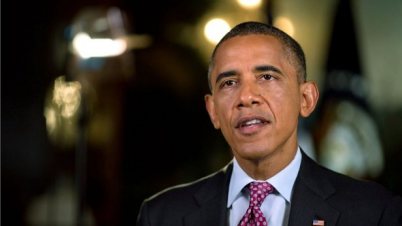
In his weekly radio and Internet address, President Barack Obama is asking people to remember the 9-11 victims and their families
Barack Obama says America has come back stronger following the horrific events of September 11 2001 in which almost 3,000 people were killed.
He insists that al-Qaeda is on the path to defeat, the U.S. having ensured that Osama bin Laden will never attack America again, and strengthened alliances with powers across the world.
“As Americans we refuse to live in fear,” Barack Obama says, congratulating those who worked to bring down Osama bin Laden and improve security across the nation.
President Barack Obama has signed a proclamation making Friday, September 7 through Sunday, September 9, 2012 National Days of Prayer and Remembrance.
In the Republican address, Senator John Barrasso of Wyoming criticized Barack Obama’s presidency.
John Barrasso said the nation isn’t better off than it was four years ago under President George W. Bush.
[youtube YbRBp9XvErU]
Three men suspected to be al-Qaeda members have been arrested in San Roque and Almuradiel, southern Spain.
Explosive material was seized at an address in San Roque where a Turkish man was arrested. Two other men were held near Almuradiel.
They are thought to have been planning an attack in Spain or elsewhere in Europe, according to the Spanish Interior Minister Jorge Fernandez Diaz.
The arrests are part of one the biggest international operations to date against al-Qaeda, Jorge Fernandez Diaz said.
The material is currently being tested but is thought to be enough to “destroy a bus”, he told reporters.
Jorge Fernandez Diaz also said that one of the suspects was a senior al-Qaeda operative with extensive experience “in the manufacture of poison and car bombs”.
One of the men put up “massive resistance” during the arrests, he added.
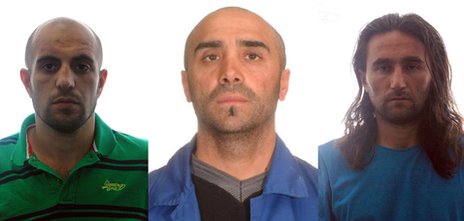
The three al-Qaeda suspects are thought to have been planning an attack in Spain or elsewhere in Europe, according to the Spanish Interior Minister Jorge Fernandez Diaz
Police found the explosives in a flat in the southern town of La Linea de Concepcion in Andalusia and arrested a Turkish national at the address.
The two other suspects were travelling on a bus from Cadiz on Spain’s Atlantic coast to Irun near the French border when they were seized in a lay-by near Almuradiel by a police special operations group, Jorge Fernandez Diaz said.
Both men are from former Soviet republics, but the minister did not say which ones.
Police suspect that at least one suspect has attended training camps in Pakistan, reports say.
Al-Qaeda in the Arabian Peninsula had issued a message at the beginning of July looking for Spanish-speaking “lone wolves” as operatives, according to Spain’s El Pais newspaper.
In March, Spanish police arrested a suspected al-Qaeda member in the eastern city of Valencia on terrorism charges.
They said he ran one of the world’s most important jihadist forums dedicated to online recruitment and propaganda operations.
The man, a Jordanian-born Saudi Arabian citizen, was known within al-Qaeda as “the librarian”, Jorge Fernandez Diaz told reporters at the time.
In March 2004, an al-Qaeda linked bomb attack on three packed commuter trains in Madrid killed 191 people and injured 1,841 others.
French police say four people have been taken hostage in CIC bank in the city of Toulouse by a man claiming to be linked to al-Qaeda.
The man fired a shot and demanded to speak to the elite police unit which shot Islamist gunman Mohamed Merah.
Mohamed Merah, who claimed to have al-Qaeda training, killed seven people in Toulouse in March before he was shot dead by police.
The director of the bank, a branch of CIC, is said to be among the hostages.

French police say four people have been taken hostage in CIC bank in the city of Toulouse by a man claiming to be linked to al-Qaeda
The regional newspaper Ouest-France says the area around the bank has been sealed off by the security forces.
“We do not know if his claim about al-Qaeda is serious or a fantasy,” a police union source told Ouest-France.
The bank is 100 metres (330 ft) from Mohamed Merah’s flat.
Mohamed Merah, a Frenchman of Algerian descent, killed seven people in three separate attacks. His victims included three children and a teacher at a Jewish school, and three soldiers.
He was shot dead by a police sniper on 22 March after commandos stormed his flat.
In the wake of the shootings, the French authorities set up an investigation into whether Mohamed Merah had accomplices and into possible Islamist indoctrination practices in prisons.
Yemeni army commander General Salem Ali Qatan leading the fight against militants in the south of the country has been killed in a suicide attack, officials say.
General Salem Ali Qatan was killed near his home in the port city of Aden, a medical official told AFP news agency.
Yemen is battling militants linked to al-Qaeda who have taken control of parts of the south of the country.
It has recently recaptured several strongholds in the restive southern province of Abyan.
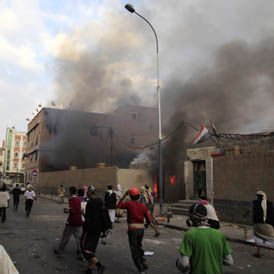
General Salem Ali Qatan was killed near his home in the port city of Aden
Gen. Salem Ali Qatan, Yemen’s southern army commander, was killed while on his way to work by a man wearing an explosives belt, witnesses said.
One report said the attacker handed Gen. Salem Ali Qatan a paper, shook his hand and then detonated his explosives.
At least four other people were wounded in the attack, AFP reported.
An al-Qaeda-linked insurgency and separatist unrest have blighted the south of Yemen for years.
Last year, empowered by uprisings against former President Ali Abdullah Saleh, Islamists consolidated their control over Abyan.
However, the Yemeni army recently launched an offensive that recaptured the towns of Shuqra, Zinjibar and Jaar.
Abu Yahya al-Libi, a senior al-Qaeda leader, was killed in a drone strike in Pakistan on Monday, a US official has confirmed.
US officials said Abu Yahya al-Libi was the target of an attack which hit a volatile tribal area of Pakistan’s north-west, killing 15 suspected militants.
There has been no confirmation of his death from sources in Pakistan.
According to officials, he played a critical role in the group’s planning against the West.
“There is no-one who even comes close in terms of replacing the expertise al-Qaeda has just lost,” the US official said.
The official added that al-Qaeda’s leadership “will be hard-pressed to find any one person who can readily step into [Libi’s] shoes”.
Washington believes that following Osama Bin Laden’s death last year, Abu Yahya al-Libi, an Islamic scholar from Libya, became al-Qaeda’s second-in-command after Egyptian-born Ayman al-Zawahiri.

Abu Yahya al-Libi, a senior al-Qaeda leader, was killed in a drone strike in Pakistan on Monday, a US official has confirmed
Abu Yahya al-Libi had gravitas as a longstanding member of al-Qaeda’s leadership, the official said, and his religious credentials meant he had the authority to issue fatwas and provide guidance to the Pakistan-based operation.
Analysts have said that he was in charge of day-to-day operations in Pakistan’s tribal areas.
He was reported killed in a drone strike in Pakistan in 2009, but it turned out to be a case of mistaken identity.
Pakistan’s frontier tribal region is considered a hub of activity by al-Qaeda and Taliban militants and it is very difficult to verify information from the region.
Reporters are prevented by the authorities from travelling to the area.
There are no further details explaining how US officials are certain that Abu Yahya al-Libi was killed by the drone strike.
In Monday’s strike, two missiles were fired at a suspected militant compound in Hesokhel, east of Miranshah – the main town in the volatile tribal region of North Waziristan.
The first missile struck the compound, killing three militants, Pakistani security officials said.
A second missile then killed 12 more militants who had arrived at the scene, they added.
It was just the latest assault after a recent surge of attacks in Pakistan – there have been eight drone strikes over the past two weeks.
It sparked anger in Pakistan and the foreign ministry lodged a formal protest with Washington’s deputy ambassador to Islamabad, Richard Hoagland.
Islamabad has called for an end to drone strikes, and today the government issued a statement saying they represented a “clear red line for Pakistan”.
Tension between the reluctant allies has been intensified by a dispute over Pakistan’s closure of supply routes to NATO troops in Afghanistan, after a NATO air strike along the Afghan border killed 24 Pakistani soldiers.
Many observers believe the attacks have been a means of applying pressure on Islamabad after a deal to reopen NATO supply routes fell through.
But drone strikes have increased in frequency since President Barack Obama took office in 2008 and hundreds of people have been killed.
The dead include senior al-Qaeda and Taliban leaders, as well as an unknown number of other militants and civilians.
The US does not normally comment on individual drone operations, but this strike came after it emerged in the New York Times that the US president personally approves or vetoes each drone strike.
Adlene Hicheur, a French physicist at the prestigious CERN laboratory has been sentenced to five years in prison for plotting terrorist attacks.
Adlene Hicheur was arrested in 2009 after police intercepted his emails to an alleged contact in al-Qaeda.
The emails suggested Algerian-born Adlene Hicheur was willing to be part of an “active terrorist unit”, attacking targets in France.
Defense lawyers argued that their client had never been part of a plot.
Adlene Hicheur, who is a particle physicist, worked as a researcher studying the origins of the universe at CERN.
His father embraced him in the Paris courtroom before he was taken away to prison.
Adlene Hicheur, 35, has already spent two and a half years in jail while awaiting trial.
He came under suspicion when threatening messages were sent to President Nicolas Sarkozy in early 2008.
The security services uncovered a series of email exchanges between Adlene Hicheur and an alleged al-Qaeda member called Mustapha Debchi.
After his arrest in 2009 police found a large quantity of Islamist literature at his parents’ home.
At the start of his trial the scientist admitted that he had been going through a psychologically “turbulent” time in his life when he wrote the emails.
Adlene Hicheur had suffered a serious back injury, for which he had been taking morphine.
But he always denied he intended to carry out any attacks.
His lawyer, Patrick Baudouin, described the verdict as “scandalous”.
“Everything has been done to demonize him,” he said.
Adlene Hicheur has not yet decided whether or not to appeal.
If he decides not to, with time off for good behavior, he should be released soon, Patrick Baudouin said.
 Prev123Next
Prev123Next  Page 2 of 3
Page 2 of 3























